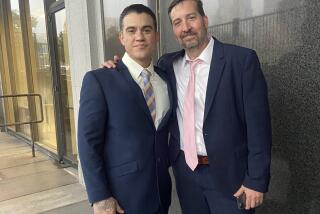A Molester Is Free -- That’s Not All Bad
- Share via
Is there any reason in the world to celebrate the release of Edward Harvey Stokes, a convicted serial child molester who informed a therapist 10 years ago he’d molested more than 200 young boys?
I’d say no. But would you think I’m nuts if I also said I’m comforted by it?
What’s known about Stokes, in his late 40s, is that he was first arrested in 1974 and was once considered by authorities to be one of the most active sex offenders in the West. His latest conviction (of several) came in Orange County in 2001, on two sex-related counts involving a 16-year-old boy. An “enhancement” charge attached to the counts landed Stokes a life sentence.
Nothing I’ve read suggests he’s had any kind of transformation that will keep him from doing what a high percentage of child molesters do -- striking again. We can only hope; Stokes has said he hopes to live out his life “without further incidents.”
I don’t find that reassuring and can’t say that I would have lost sleep over a lengthy prison term for him.
But there is the tiny matter of the American justice system. Our contemplation of Stokes today is a test of just how much we value that system.
I’ll confess straight up: I value it a great deal. I don’t want to be one of those people who calls himself a red-blooded American and is then willing to look the other way when one of our bedrock principles is at stake.
That is precisely what Stokes represents. Last November, a three-member state appeals court in Orange County ruled that Stokes didn’t get a fair trial. At the heart of the ruling was a finding that the San Bernardino County Sheriff’s Department withheld for far too long statements provided by the alleged victim that might have affected how Stokes defended himself.
The panel said the statements were relevant “to the victim’s credibility as a whole, particularly in assessing whether any of the alleged sexual acts were committed against the victim’s will.”
The panel said it “cannot profess confidence in the court’s guilty verdicts” or on the enhanced allegation that prompted the life sentence.
Maybe the three justices didn’t know anything about Stokes’ history, but I’m guessing they somehow did. If so, it means they couldn’t have been thrilled with their ruling that resulted in his release 11 days ago. The release followed a refusal by the state Supreme Court to overrule the appeals court.
At the risk of sounding schmaltzy, the court’s decision is the kind upon which our justice system is built. We’re supposed to go where the law takes us, unpopular or not.
I ask William Kopeny, who handled Stokes’ appeal, if he had misgivings about Stokes’ release. Kopeny knows the research on recidivism of child molesters but says the system doesn’t put the burden on former felons to prove they won’t commit future crimes.
“I have three children and would feel horrible that anyone might place them in danger, particularly with a crime like this,” Kopeny says. “If, in fact, someone is victimized by Mr. Stokes, I will feel horrible for that person, but won’t have any sense of guilt or responsibility for anything Mr. Stokes does. If he was guilty in this case, he’s free because he didn’t get anything close to a fair trial.
A free Edward Harvey Stokes as a cause to celebrate? Hardly.
But a group of judges that upholds our grandest traditions? I’ll toast that any day.
*
Dana Parsons’ column appears Wednesdays, Fridays and Sundays. He can be reached at (714) 966-7821 or at dana.parsons@latimes.com. An archive of his recent columns is at www.latimes.com/parsons.
More to Read
Sign up for Essential California
The most important California stories and recommendations in your inbox every morning.
You may occasionally receive promotional content from the Los Angeles Times.













